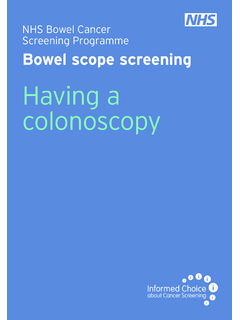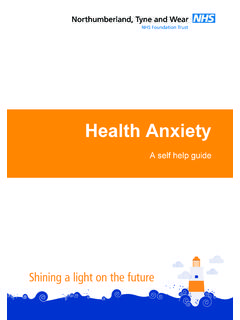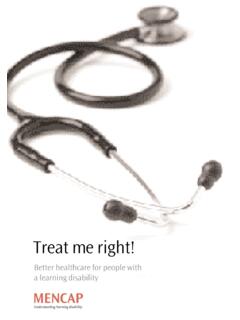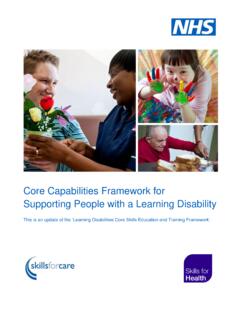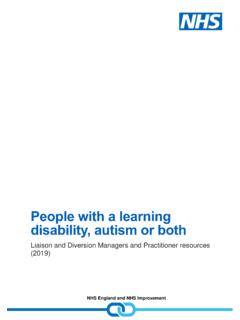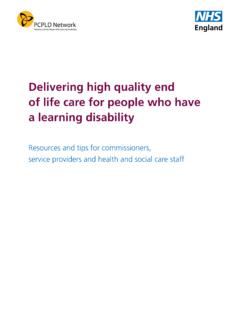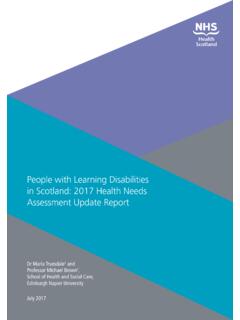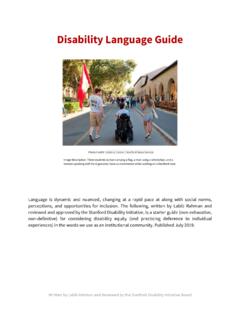Transcription of Getting it right for people with learning disabilities - NHS
1 Getting it right for people with learning disabilitiesGoing into hospital because of mental health difficulties or challenging behaviours:What families need to know23 The way the NHS provides care to vulnerable individuals at a time when they need our help most should be our absolute priority and act as a true litmus test of quality of care more broadly in the NHS. Making sure that care is compassionate, dignified and person-centred in whatever setting is paramount to what we do at NHS England. Ensuring that people with learning disabilities who have a mental health problem, or exhibit behaviours that are perceived as challenging, receive the right support continues to be our priority.
2 To make this happen for everyone, strong leadership and partnerships working with commissioners, providers, health care professionals, regulators and people with learning disabilities , their families and carers will be needed. The role of families and carers in this is often underestimated and understated. I am really pleased that NHS England has been able to support the development of this booklet, as going into hospital is a significant life event for people with learning disabilities and their families and carers. This booklet recognises the unique contribution that carers and families make to the lives of their relatives. It was produced with carers who have had direct experience of hospitals and it draws on what would have helped them in supporting their do hope that this will be a useful information resource for other carers who find themselves in similar situations.
3 Caroline Alexander Chief Nurse NHS England (London Region) AcknowledgementsThis booklet has been developed as a result of the collective experience and advice of parents and siblings of people with learning disabilities . Very sincere thanks are owed to all those who took part in meetings to develop the content, and to those who commented on booklet was initiated by NHS England and would not have been possible without the support of Stephan booklet was written by Angela Cole and Alison Giraud-Saunders for NHS Some key messages How and why people go into hospital units Why are people admitted?
4 How is the decision made to admit a person? Exploring alternatives The law a) voluntary admission b) compulsory admission ( sectioning ) c) admission in a crisis or emergency situation d) admission through the courtsAbout the unit Where it is What it does and who it s for Assessment and Treatment Units for people with learning disabilities General psychiatric units Secure accommodation What it s like and how good it is Getting involved and being heard rights and responsibilities Paying for the hospital stay Making sure the hospital delivers good support Co-ordinating care Co-ordinating treatment Decision-making and mental capacity Consent to treatment The Care Programme Approach and reviews Being kept in hospital Oversight and Appeals Having time on leave from the hospital Access to health records Discharge
5 And care after leaving Your rights versus your loved one s rights Human rights Assessment and treatment Who and what? Physical health assessment Treatment Medication Behavioural interventions Therapies What happens day to day Responding to challenging behaviours Quality of support Relationships on the unit Returning to community life Planning for discharge Carer s assessment Support after leaving hospital What to do if you have concerns Organisations that can help Other helpful things to read P4P5P6P6P7P7P7P7P8P9P9P11 P11 P12P12 P12P12P13P16P17P17P17P17P18P18 P20 P20P21P22P22 P22 P23P25 P25P26P27 P28P28P28 P29P29P30P31P31 P32P33 P33P34P34P36P37P3845 This booklet gives youThe booklet
6 Was developed with the involvement of family members of people with learning disabilities who have spent time supporting people in hospital units. The content of each section reflects their experiences and what they feel family members really need to 2012 the Panorama television programme uncovered criminal abuse at an in-patient Assessment and Treatment Unit for people with learning disabilities called Winterbourne View. It led to staff being prosecuted and the unit closing down. A report from the enquiry1 highlighted that families were often not involved in decisions about where people were sent, parents and siblings found it difficult to visit and families concerns and complaints were often not acted on.
7 This booklet should give you information and confidence to challenge such practices. There s a lot in this booklet about the law and people s rights . It focuses on information that is likely to be relevant to most people , but there is much, much more that hasn t been included. Where possible we have indicated where you can find more detailed hope that you find the booklet helpful. Based on their own experiences, the family advisers said if you want to advocate successfully for a person who needs to go into a hospital unit, it is really important that you: try to get good assessment and treatment for the person at home first, to avoid them having to go into hospital; visit and have lots of contact with the person if they do go into hospital (if they want it); encourage other people in the person s wider circle to maintain regular contact; provide the hospital team with detailed, background information, for example copies of letters.
8 Create a positive relationship with the team by being as calm as possible, and not confrontational; are open to advice from the professional team; give advice and explain things about the person to the team; don t make assumptions - ask questions so you understand what is happening, and why; attend meetings, and send someone else if you can t; support the advocate who is linked to your loved one by providing information and meeting with them; stay observant and raise any concerns you have promptly. Information so that you don t feel powerless;A picture of what you and the person you care about should expect to happen: the standards that services should achieve;Suggestions about things you could do to help make sure the person you care about receives the right treatment and support.
9 These suggestions are flagged up by a things to do symbolLinks to helpful organisations and further information. These links are flagged up by a signpost symbolWelcomeSome Key Messages1 Transforming Care: A national response to Winterbourne View Hospital DoH Dec. 2012 This booklet is for parents, brothers and sisters, grandparents, aunts and uncles, cousins, good friends anyone who cares about and is close to a person with learning disabilities . It will help you to protect their interests if they are admitted to hospital because of mental health difficulties or because they present behaviours that are challenging. 1234 Getting supportThe law relating to this area is quite complex.
10 This booklet gives you an overview, but it is strongly advised that you get advice from a solicitor if you are unhappy about your loved one s legal position in and why people go into hospital unitsSpecialist Assessment and Treatment UnitsGeneral Psychiatric UnitsSecure UnitsWhy are people admitted?How is the decision made to admit a person?The Mental Capacity Act (2007) and the Mental Health Act (1983) are the main laws that govern person may agree to be admitted to hospital as a voluntary patient or they may be sectioned and become a detained patient. The LawThe Mental Health Act focuses on mental disorder - conditions such as schizophrenia, depression, anxiety disorder, obsessive-compulsive disorder, eating disorders, personality disorders, Autistic-Spectrum Condition, dementia, behavioural changes due to brain injury and mental disorders due to drug use.
